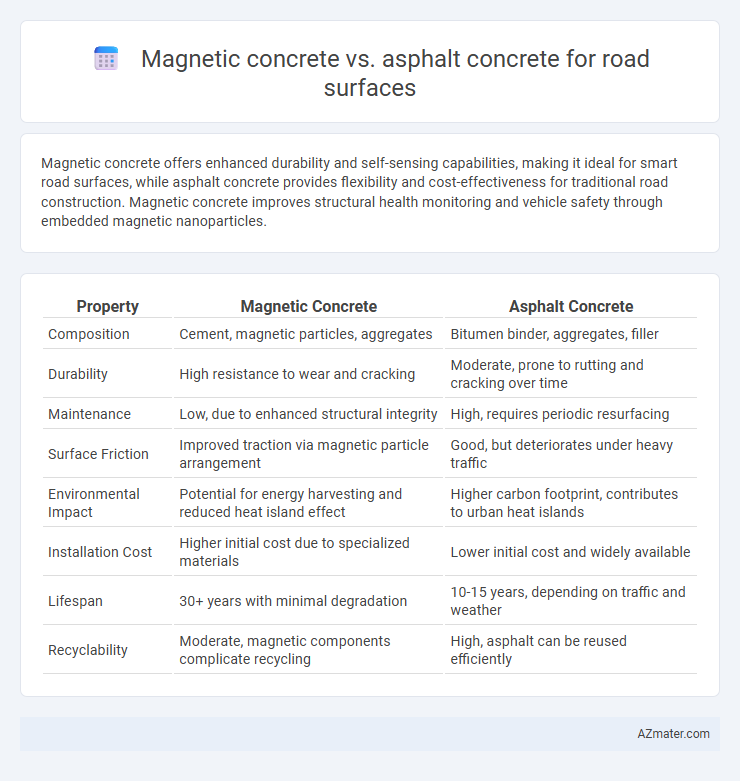Magnetic concrete offers enhanced durability and self-sensing capabilities, making it ideal for smart road surfaces, while asphalt concrete provides flexibility and cost-effectiveness for traditional road construction. Magnetic concrete improves structural health monitoring and vehicle safety through embedded magnetic nanoparticles.
Table of Comparison
| Property | Magnetic Concrete | Asphalt Concrete |
|---|---|---|
| Composition | Cement, magnetic particles, aggregates | Bitumen binder, aggregates, filler |
| Durability | High resistance to wear and cracking | Moderate, prone to rutting and cracking over time |
| Maintenance | Low, due to enhanced structural integrity | High, requires periodic resurfacing |
| Surface Friction | Improved traction via magnetic particle arrangement | Good, but deteriorates under heavy traffic |
| Environmental Impact | Potential for energy harvesting and reduced heat island effect | Higher carbon footprint, contributes to urban heat islands |
| Installation Cost | Higher initial cost due to specialized materials | Lower initial cost and widely available |
| Lifespan | 30+ years with minimal degradation | 10-15 years, depending on traffic and weather |
| Recyclability | Moderate, magnetic components complicate recycling | High, asphalt can be reused efficiently |
Introduction to Road Surface Technologies
Magnetic concrete integrates iron particles to enable electromagnetic applications, enhancing road safety and maintenance monitoring compared to traditional asphalt concrete. Asphalt concrete remains the most widely used material worldwide due to its cost-effectiveness, ease of repair, and smooth driving surface. Recent advances in road surface technologies emphasize durability, environmental impact, and smart infrastructure integration, positioning magnetic concrete as a potential innovative alternative in modern pavement engineering.
Overview of Magnetic Concrete
Magnetic concrete integrates ferromagnetic materials such as iron powder or magnetic nanoparticles within its matrix, enabling unique properties like electromagnetic interference shielding and self-sensing capabilities. This innovative material exhibits enhanced durability and potential for energy harvesting compared to traditional asphalt concrete, which primarily relies on bitumen for binding aggregates. Magnetic concrete's ability to interact with magnetic fields makes it suitable for smart infrastructure applications, including real-time structural health monitoring and traffic management systems.
Overview of Asphalt Concrete
Asphalt concrete consists of a mixture of aggregates, binder (bitumen), and filler materials, providing a durable, flexible road surface ideal for various traffic conditions. Its high adaptability to temperature variations and ease of maintenance make it preferred for road construction worldwide. Compared to magnetic concrete, asphalt concrete offers established performance standards and economical benefits for large-scale pavement projects.
Material Composition and Properties
Magnetic concrete incorporates ferromagnetic materials such as iron ore and steel fibers, enhancing its electromagnetic properties and durability, whereas asphalt concrete is primarily composed of bitumen and aggregates, offering flexibility and waterproofing. The magnetic concrete's high compressive strength and self-sensing capabilities contrast with asphalt's superior resistance to deformation and fatigue under traffic loads. Material composition dictates that magnetic concrete excels in structural monitoring and longevity, while asphalt concrete remains favored for its cost-effectiveness and ease of maintenance in road surfaces.
Installation Methods and Construction Processes
Magnetic concrete installation involves embedding ferromagnetic particles within the concrete mix and requires precise placement of magnetic coils or sensors to enhance functionality, which adds complexity to the construction process. Asphalt concrete installation uses a simpler method, involving heating and laying of bituminous mixture followed by compaction with rollers, resulting in faster and more cost-effective road surface construction. The curing time of magnetic concrete is longer due to its specialized composition, while asphalt concrete allows for quicker traffic reopening due to its rapid cooling and setting properties.
Durability and Maintenance Requirements
Magnetic concrete exhibits enhanced durability due to its resistance to cracking and deformation caused by thermal expansion and heavy traffic loads, outperforming traditional asphalt concrete in longevity. Maintenance requirements for magnetic concrete are significantly lower since it does not soften under high temperatures or develop potholes as frequently as asphalt, reducing repair frequency and costs. Asphalt concrete, while initially less expensive, demands regular sealing and patching to address surface degradation and rutting, resulting in higher long-term maintenance efforts compared to magnetic concrete.
Environmental Impact and Sustainability
Magnetic concrete offers significant environmental benefits over asphalt concrete by reducing the urban heat island effect through enhanced heat absorption and dissipation, leading to lower surface temperatures and decreased energy consumption for cooling. Its longevity and reduced maintenance frequency contribute to less resource extraction, waste generation, and carbon emissions throughout the road lifecycle. Asphalt concrete, while widely used, relies heavily on petroleum-based binders, resulting in higher greenhouse gas emissions and limited recycling options compared to the more sustainable, potentially recyclable magnetic concrete composites.
Cost-Effectiveness Analysis
Magnetic concrete offers potential long-term savings through reduced maintenance costs and enhanced durability compared to asphalt concrete, which typically requires frequent repairs and resurfacing. Initial installation costs for magnetic concrete are higher, but its ability to incorporate energy-harvesting features may offset expenses over time. Asphalt concrete remains cost-effective for short-term projects due to lower upfront costs and widespread availability.
Performance in Various Climate Conditions
Magnetic concrete exhibits superior durability and resistance to freeze-thaw cycles compared to asphalt concrete, making it highly effective in cold climates. Asphalt concrete performs well in moderate temperatures but is prone to softening and rutting under high heat, reducing its lifespan in hot, sunny regions. Magnetic concrete's enhanced thermal stability and crack resistance ensure better performance across diverse climate conditions, minimizing maintenance costs over time.
Future Trends and Innovations in Road Surfacing
Magnetic concrete integrates ferromagnetic particles that enable electromagnetic field applications for self-healing and improved durability, presenting a futuristic alternative to traditional asphalt concrete which primarily relies on bitumen for flexibility and repair. Innovations in road surfacing are increasingly focusing on smart materials like magnetic concrete to facilitate real-time monitoring, autonomous vehicle navigation, and energy harnessing through embedded sensors. Future trends emphasize sustainability, with magnetic concrete advancing the development of more resilient, intelligent infrastructure while asphalt continues evolving with polymer modifications and recycled additives to enhance environmental performance and lifespan.

Infographic: Magnetic concrete vs Asphalt concrete for Road surface
 azmater.com
azmater.com